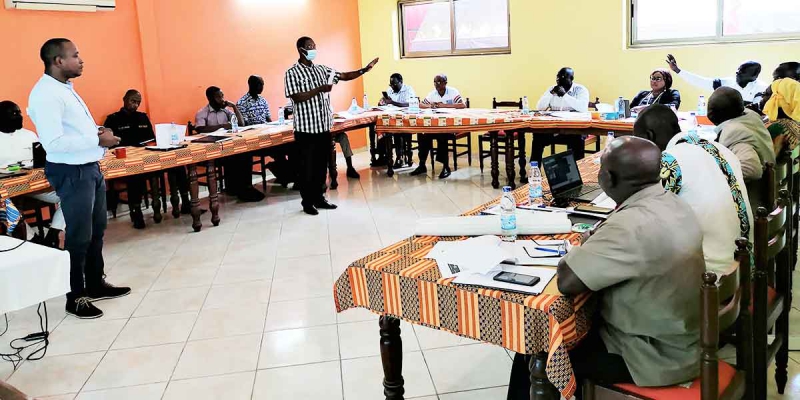Equipping municipalities with a strategic tool to assess their institutional capacity building needs is one of the activities of the West Africa Municipal Water, Sanitation, and Hygiene (MuniWASH) project - a five-year project funded by the United States Agency for International Development. Among the anticipated outcomes of the project is the improvement of municipal governance and management capacities of municipal actors in the water and sanitation sector. By their strengthening institutional capacities, municipalities will have the skills and autonomy to advocate for their WASH priorities to high-level decision-makers in charge of planning, budgeting, management, regulation, and monitoring of water and sanitation services. This new dynamic will foster successful collaboration between municipalities and the central government.
At the conclusion of a transparent, participatory selection process, eight municipalities in Benin and eight municipalities in Côte d’Ivoire were selected as beneficiary partners of MuniWASH. The project is aiding municipal administrations, national departments and agencies, and service providers to improve water and sanitation services while including poor and vulnerable populations. To help achieve these goals, MuniWASH will equip the 16 target municipalities with a tool called the Institutional Strengthening Index.
This Institutional Strengthening Index tool proposes a method for assessing the capacity of organizations based on a shared analysis of essential and non-exhaustive functions such as: human resources/staff skills, policies and procedures, facilities/equipment and technologies, citizen engagement, and systems and processes. This approach facilitates a diagnosis of institutional weaknesses through a self-assessment process that examines the functions of the communal contracting authority relating to the water, sanitation and hygiene sector. The tool will enable municipalities to have a reliable benchmark of their present capacity in order to identify deficiencies, and consequently, define a capacity building plan based on the gaps they observed.
Prior to deployment, the MuniWASH team trained technical ministries, as well as representatives of communal organizations of Benin and Côte d'Ivoire, namely the National Association of Communes of Benin and the Union of Cities and Communes of Côte d'Ivoire on this tool. These commune umbrella organizations will play an important role in mobilizing communes to leverage the information generated by the tool in the 16 municipalities/communes targeted by the project. “The Institutional Strengthening Index is neither an audit nor an evaluation of the quality of the services provided by the mayor's office, but rather evaluates the internal capacity to deliver them," explained MuniWASH consultant Sarah Leddy, who led the online training. Preliminary training will be followed by a pilot phase where the tool will be applied in one municipality before being extended to all 16 target municipalities in Benin and Côte d'Ivoire. Data will be collected for input to the tool through interviews with mayors and their deputies, members of municipal councils, mayor's office staff, and civil society organizations advocating for water and sanitation issues in each of the two countries.

 English
English  Français
Français 
